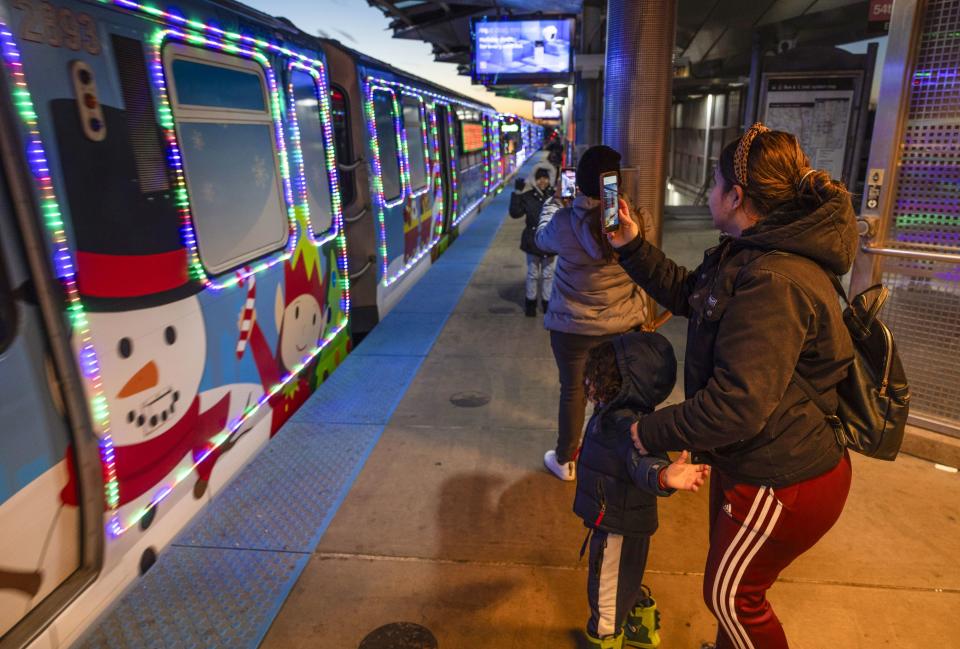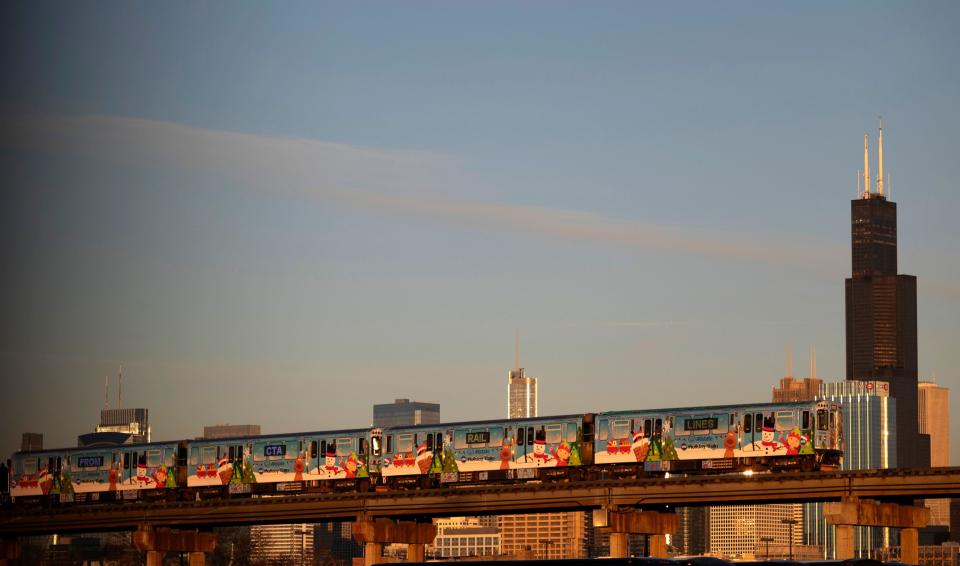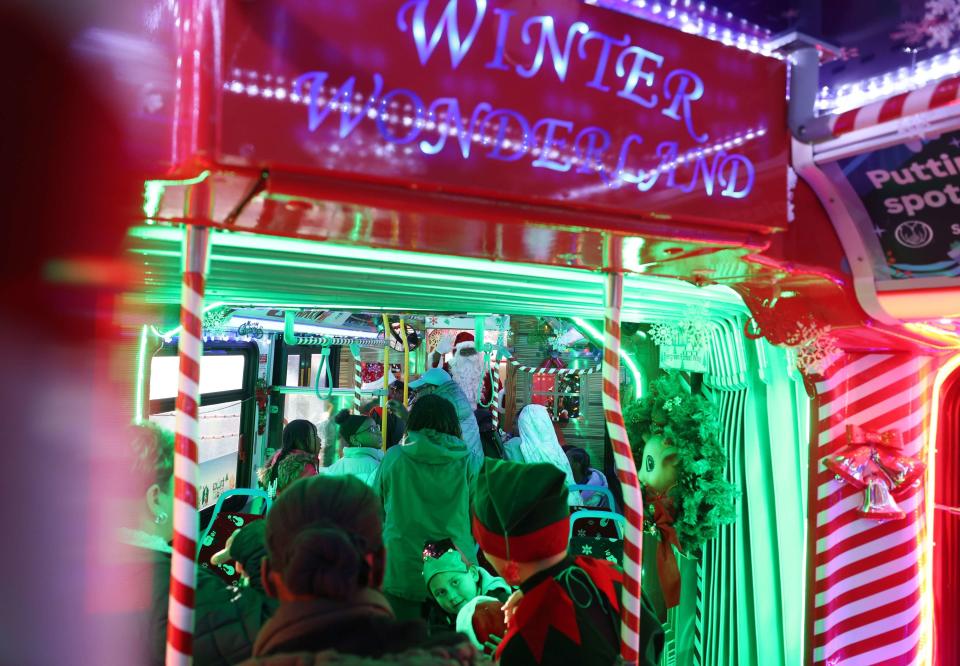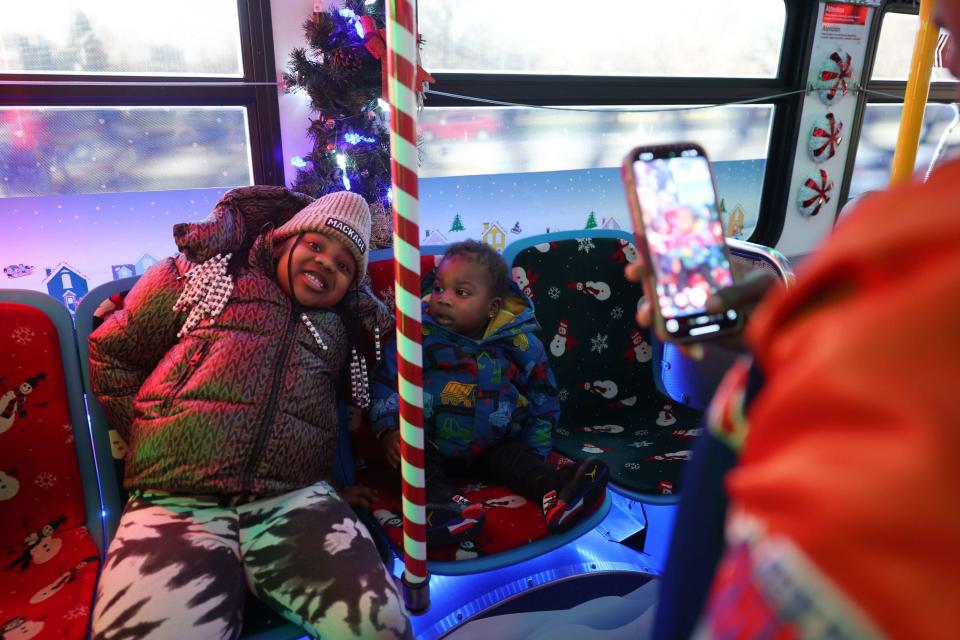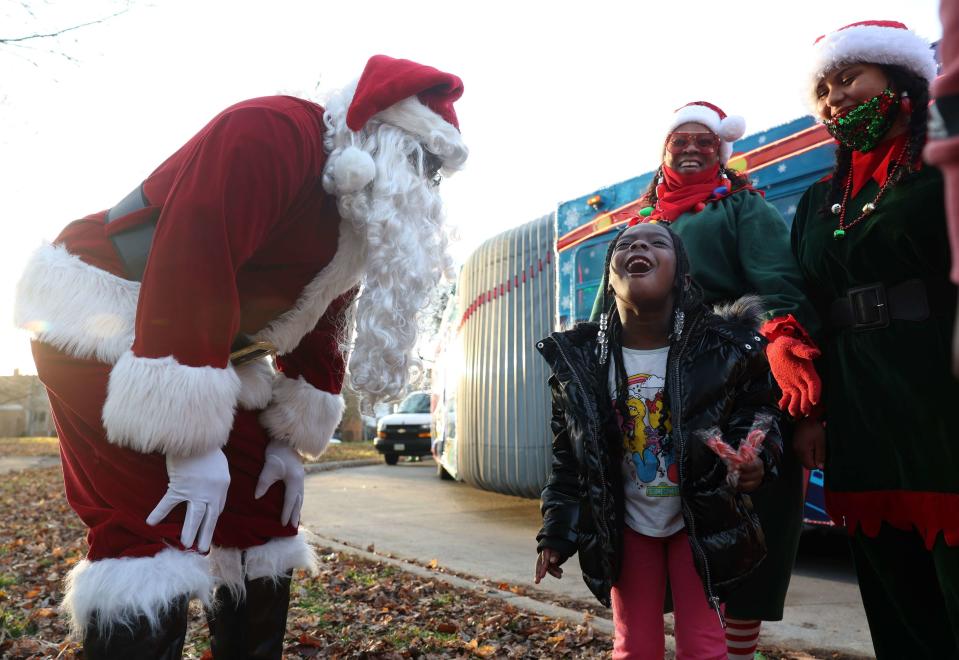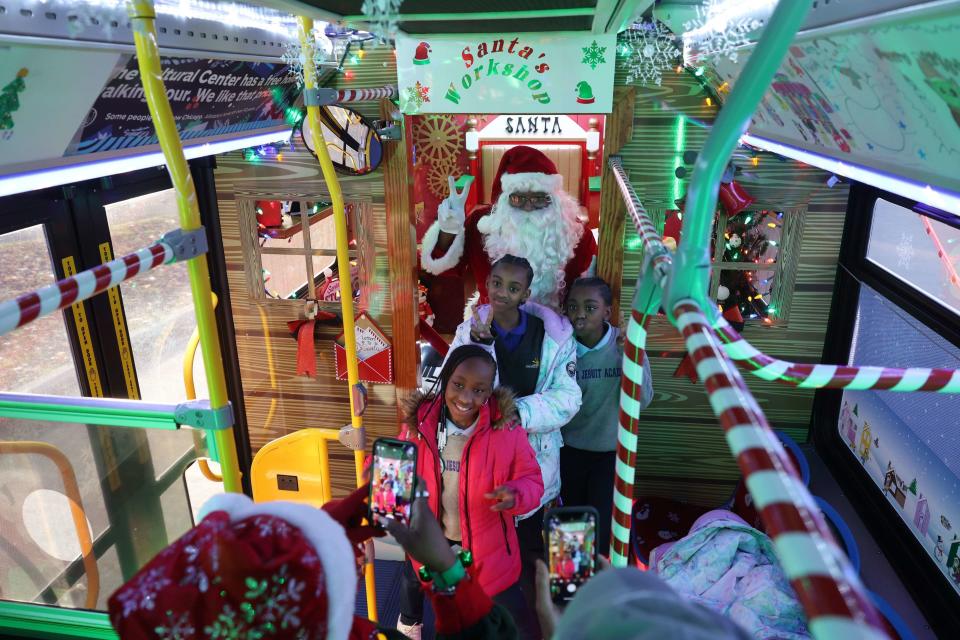Snowflakes, candy canes and 36,000 LED lights: The making of the CTA holiday fleet
- Oops!Something went wrong.Please try again later.
Early in December, “Peppermint the Elf” said, she opened the door of a Chicago Transit Authority bus for a commuter in a suit and tie.
The man boarded the bus, awash in red and green light. The poles for standing riders were striped red and white like candy canes, with tinsel wreaths and reindeer all over the walls. The air was heavy with cinnamon and Bing Crosby.
The man in the suit sat down on the CTA Holiday Bus, his chair patterned with snowflakes. He accepted a miniature candy cane from Peppermint. Then, she said, he burst into tears, saying that he felt like a kid again.
He’s far from the first Chicago commuter to stumble into a surprise winter wonderland on the holiday fleet, an elaborate 32-year tradition employees say brings nostalgic joy to customers.
“This bus, if you stay on long enough, it’s so much fun,” said Peppermint, a 21-year Chicago Transit Authority employee. “But you have to have spirit for it.”
All of the seasonal characters on the CTA’s holiday fleet are employees of the transit system, but their proper names are kept secret from riders and reporters.
The CTA holiday train and bus are returning to seasonal glory after quiet pandemic years, running without passengers in 2020 and without Santa in 2021.
Along with North Pole photo ops, holiday fleet riders enjoy seasonal music, candy canes and collectible buttons.
“Most of the time, it’s the adults that are happier than the kids,” CTA spokesperson Maddie Kilgannon said.
The winter tradition dates back to a 1992 Blue Line run, when an O’Hare employee placed a “Season’s Greetings from the CTA” sign on a train making runs of charity food packages.
Santa rode his first holiday train in 1995, with passengers invited aboard the next year. A lone holiday bus joined the party in 2014.
The tradition was undeterred when a holiday car derailed while dashing through the Brown Line route in 2003, forcing more than 100 passengers to evacuate near Sedgwick station.
The holiday train also survived threats of cancellation in 2004, as then-CTA President Frank Kruesi worked through deficits in the 2005 operating budget.
On the bus, plastic shields protect a snowy model village, complete with tiny train cars.
Route signs direct riders toward the North Pole, and blocks of cinnamon make it smell like someone’s baking cookies under the seats.
“It takes quite a bit of time to take down, because we restack everything and make sure it comes down in sections,” senior maintenance manager Stephen Wojnicki said.
Most train and bus decor is recycled each year, stored in the CTA’s South Shops stockroom, Kilgannon said. Interior lighting, ornaments, custom seat covers, elves’ costumes and rooftop bells are reused, plus Santa’s chair and the padded wood stage where it rests.
Lights on top of the bus are also recycled, as are interior and exterior wraps, Wojnicki said. The custom designs are reapplied every year in-house, with a technique usually used for advertisements.
Allstate, which has sponsored the fleet almost every year since 2018, foots most of the bill for new items. On the bus side, this included 36,000 new LED lights and a remodeled “toy workshop” section for Santa. The fleet did not have a sponsor in 2020, since riders could not actually board the train.
“The sponsorship became available and (CTA employees) were kind of shopping it around,” Allstate chief creative officer David Hernandez said. The insurance giant plans to keep sponsoring the train at least through 2024.
Sprint was the fleet’s first sponsor in 2015 as part of a $300,000 deal with the CTA, covering the holiday bus and train operating budget plus an extra day of service. Jewel-Osco also sponsored the train in 2017. CTA personnel remain tight-lipped on how the total cost of the holiday bus and train has evolved since.
Allstate also declined to disclose how much it contributes to the train, citing privacy agreements.
The CTA keeps costs down by keeping holiday builds in-house. Wojnicki oversees full-time teams of mechanics, electricians, painters, carpenters and upholsters, who maintain CTA buses year-round but focus on the holiday bus each fall. Parallel teams work on the holiday train in a Skokie rail maintenance facility.
A safety team also checks that decorations don’t pose fire hazards or seizure risks, while a CTA employee rides each run as a “manager” in case of emergency.
“We try to get it up and running as soon as possible,” Wojnicki said. “We want to create a very cheerful experience. We want to put our best face on.”
Some tchotchkes are also donated by employees. When Santa pokes his head through the roof hatch between stops on the bus, he is surrounded by dolls, trucks, puzzles and games outgrown by CTA families.
Employees also collect food donations, which will be distributed from the holiday bus on Dec. 18 and 19.
“The smiles, the happiness, everybody feels it,” Santa told the Tribune. “That’s the point of all of this — to bring cheers and laughter to people who need it. The kids, they go bananas.”
The advertisements which typically rest above riders’ heads are replaced on the holiday fleet with children’s artwork, plus a few plugs for Allstate.
The sponsorship agreement covers advertising for Allstate at train and bus stations while the holiday fleet runs. This year’s digital ads change based on the weather, Hernandez said.
Allstate also gets some creative oversight as to how the train and bus are decorated.
“A lot of the work that’s in there is about our local knowledge,” Hernandez said. “Some tips and tricks about what you can do in and around the city to celebrate the holidays … it’s a really fun way for us to remind people that we’re not just a big Fortune 100 brand, we were born and raised in Chicago.”
The holiday fleet is one of many corporate sponsorship opportunities introduced by the CTA over the years. In 2012, MillerCoors sponsored a New Year’s Eve campaign where CTA rides cost a penny.
The beverage company paid $1.3 million for the sponsorship deal, in exchange for a CTA-wide marketing campaign called “Great Beer, Great Responsibility” complete with branded fare cards.
The 2012 campaign also invited corporations to sponsor 11 stations on the Red, Blue, Green and Orange lines. Then-President Forrest Claypool offered naming rights to the station of their choice, and first dibs on any advertisements there, for a rate increasing 5% every year.
The transit agency also considered renaming the North/Clybourn station in 2010 during a $3.9 million deal with Apple.
Between Thanksgiving and Christmas, the holiday train rides every line. The Yellow Line is always last, as it requires two cars to be split from the six-piece train. The CTA debated whether the Yellow Line, which remains shut down after a train crashed into a snowplow near the Howard station last month, will run the holiday train this year, Kilgannon said. The Yellow Line’s holiday train run was ultimately canceled.
Planning bus routes is a little more complicated. Santa and his elves will ride 16 of the CTA’s 128 bus lines by Christmas.
Routes are chosen geographically, and also by equipment type, Kilgannon said. The holiday bus is articulated — it bends in the middle — which can’t be accommodated by all garages. This year, the CTA focused on bus routes departing from the Chicago, Kedzie and 77th street garages.
“You have riders that are literally waiting at certain stops just to ride this particular bus,” Kilgannon said. “It’s a huge deal for the general public.”
The same “elves” work on the bus all season long, Kilgannon said. CTA employees are chosen weeks in advance based on their work record. Each elf works up to three days a week on the fleet until its last ride — no overtime necessary.
On the holiday bus, a team of 10 elves work three at a time to hand out candy canes and wave madly through the front window, coaxing smiles from passersby. Each elf picks their own holiday name.
Peppermint the Elf has been working for the CTA for more than two decades and as an elf for four. This year, she will spend her birthday on the holiday bus.
“It is absolutely fantastic. I actually plan my year around the holiday bus,” Peppermint said. “Kids, elderly people, literally grab you and hug you and kiss you.”
To those wondering why the CTA puts resources into the holiday fleet amid long wait times and ghost buses and trains, Kilgannon said the latter are an effect of staffing crises. The CTA sees holiday rides and ghost rides as entirely separate issues, she says.
“We can walk and chew gum at the same time,” Kilgannon said. “We can address service challenges and do innovation and construction, and we can run this fun bus on top of it all.”
Holiday building is built into technicians’ schedules, Kilgannon said. But when a bus or train ghosts, it’s likely because no driver showed up to fill that route.
To stabilize short-staffed routes, the CTA hired upward of 700 drivers this year, CTA Vice President Jairo Naranjo said. Hiring events at community colleges helped, as did eliminating the requirement for a commercial drivers’ license. Applicants were offered a training course at Olive-Harvey College to obtain their license, paid for by the CTA, before starting work.
“We’ve met our hiring goal for bus operators for the year,” Naranjo said. “After COVID, we have had a lot of staffing challenges … it is very labor-intensive.”
The CTA’s new goal, Naranjo said, is to have a collection of extra drivers on duty, so that routes can be refilled instead of canceled when drivers drop out.
And, of course, to give Santa some practice before his Christmas Eve route.
“It feels cool standing on the bus,” Santa said. “It reminds me of my sleigh.”
